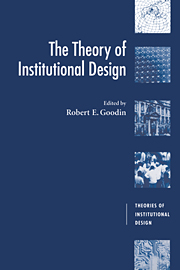Book contents
- Frontmatter
- Contents
- Notes on Contributors
- Preface
- 1 Institutions and Their Design
- 2 Institutional Design and Rational Choice
- 3 Second Best Theories and the Implications for Institutional Design
- 4 The Informal Logic of Institutional Design
- 5 Institutional Morality
- 6 The Publicity Principle
- 7 Designing Institutions in East European Transitions
- 8 Political Deals in Institutional Settings
- 9 Self-inventing Institutions: Institutional Design and the U.K. Welfare State
- 10 Selection and the Currency of Reward
- Name Index
- Subject Index
10 - Selection and the Currency of Reward
Published online by Cambridge University Press: 05 August 2012
- Frontmatter
- Contents
- Notes on Contributors
- Preface
- 1 Institutions and Their Design
- 2 Institutional Design and Rational Choice
- 3 Second Best Theories and the Implications for Institutional Design
- 4 The Informal Logic of Institutional Design
- 5 Institutional Morality
- 6 The Publicity Principle
- 7 Designing Institutions in East European Transitions
- 8 Political Deals in Institutional Settings
- 9 Self-inventing Institutions: Institutional Design and the U.K. Welfare State
- 10 Selection and the Currency of Reward
- Name Index
- Subject Index
Summary
The best security for the fidelity of mankind is that interest be made coincident with duty.
–James Madison, Federalist Paper No. 72Incentives and the Economic Theory of Institutions
Within the economic theory of institutional design (within which I somewhat gratuitously include the writings of the American founding fathers – hence the epigraph), the central features of any institutional arrangement are captured by the structure of incentives that that arrangement embodies. The central property of the idealized free market, for example, is seen to be the fact that producers are encouraged to operate in the interests of their customers by virtue of the incentive effects created by market prices. Equally, market “failure” is identified when market incentives fail to reflect adequately the interests of relevant others, as is the case with monopoly or externalities or in the provision of public goods. Somewhat analogously, within the economic theory of politics, the success or otherwise of democratic political processes is seen to depend on the extent to which electoral competition constrains candidates to offer policy platforms that are in the interests of their constituents (assumed under the democratic rubric to include all the relevant citizenry). And the normative analysis of alternative political institutions – such as bicameralism, or representation or political parties or the separation of powers – mainly focuses on the extent to which those institutions support or deflect electoral competition in encouraging would-be political agents to act in constituent interests.
- Type
- Chapter
- Information
- The Theory of Institutional Design , pp. 256 - 276Publisher: Cambridge University PressPrint publication year: 1996
- 12
- Cited by



